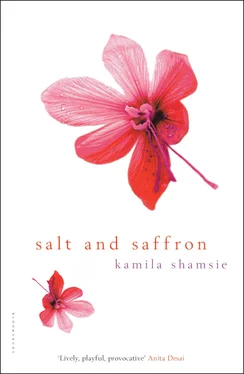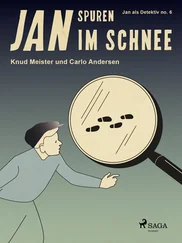‘Taj, the midwife,’ she said, one manicured nail circling the name of the Nawab who killed a tiger with his bare hands. ‘With her head full of family lore and no reason to love those oh-so-legitimate babies she brought into the world. How do we know she didn’t invent, make up … Oh, let’s say it straight. How do we know Akbar, Taimur and Sulaiman didn’t enter the world on the same day, all just before or just after midnight?’
‘Because their mother—’
‘Samia, please. I’ve given birth in the days before these super painkillers and epidurexes — Rehana, you wouldn’t laugh if you’d been through it yourself — and I would have believed anything, yes anything, anyone said to me afterwards about when the clock chimed and when it didn’t.’ She smiled, as though thinking of something that pleased her inordinately. ‘Maybe Taj saw triplets and wondered if they qualified as not-quite-twins. And then maybe she saw the clock and thought, Why not. Let me make them believe it’s so. Let this be my revenge for their treatment of my mother and me.’
I was thinking, believe me, of my earlier conversation with Samia about Taj. I was thinking that, and thinking also that of course I wasn’t the first woman in the family to be bothered by Taj’s role in our narrative. So I said, ‘Well, I can understand why you feel a sense of affinity with Taj.’
Was it the air, the company, the tilt of my head? I don’t know. I just know that as soon as the words were out something transformed them. At the periphery of my vision, Samia was shaking her head at me and Rehana had turned her face away, but Baji only laughed, throwing her head back and showing all her cavities. ‘Oh, I see Abida in you. I see her so clearly. You with the untainted blood. Here …’
She swooped forward and picked the trailing end of the family tree off the floor, unrolling it on to my lap. ‘Here’s a pair of not-quites you don’t know about.’
Beside Mariam Apa’s name, a star.
A diagonal dotted line connected it to another starred name.
Mine.
I’d had the opening line of Mariam’s story ready for a long time: In all the years my cousin, Mariam, lived with us she only spoke to order meals. The next line varied, according to my mood. Usually it was: Strictly speaking, she was more aunt than cousin, though I always called her Apa. But when I was feeling more fanciful I sometimes replaced that with: She taught me the textures of silence, the timbres of it, and sometimes even the taste.
My first thought when Baji showed me those stars was, the opening line will have to change. The story must begin with the curse of not-quites.
I should have thought, How is this possible? Given chronology, given science, given my life. How? But Rehana Apa was up and moving towards me, distracting me with her purposefulness as she pulled me up and said, ‘Baji, remember Hamlet? I’m taking Aliya out for something to eat. Samia, stay and look after my grandmother. She’s about to go into regret.’ She turned to me. ‘Where to?’
I thought, Hamlet? I said, ‘Any doughnut shop.’
‘To Piccadilly Circus then,’ Rehana Apa said. She allowed me silence as we walked. I suppose she thought I was thinking of that star beside my name. But actually I was thinking of America. My college days, so recently finished, were days of empty spaces in my head. Spaces without chatter, spaces without textured silences. I was so utterly foreign there, so disconnected from everything that went on that I could afford to be passionate about the tiniest injustice in the domestic news.
‘I don’t really want a doughnut,’ I said. I put on my best academic voice. ‘The word “doughnut” is a sign, the visual image of the doughnut is the signifier and a nostalgia for another life is the signified.’ I gestured vaguely with my hand. ‘Can we just go and sit under a tree instead?’
Rehana Apa said she knew a wonderful tree, and indeed she did. A shady beech in Green Park. Or perhaps it was an elm. Or an oak. I know nothing about trees, but I’ve read enough novels set in England to be pretty sure no other trees of importance exist there.
‘What about Hamlet should Baji remember?’ I sat down, unmindful of the damp.
Rehana Apa touched her palm to the tips of the grass, found the grass wet, dried her palm with a tissue and sat down anyway. ‘When Polonius says he’ll treat the players as they deserve, and Hamlet says, “Use them after your own honour and dignity; the less they deserve, the more merit in your bounty.” ‘
‘Such an aristo remark,’ I said. ‘Combat abuse with nobility; it’ll make the other guy look so small.’
Rehana Apa shook her head at me. ‘I love Hamlet in that moment. It makes me weep for everything he’s forced to become.’
I leant against the tree trunk and tried not to stare at her. My cousin. She must have been a dozen or so years older than me, and suddenly that didn’t seem very much. And here we were, talking about Hamlet. With everything else there was to talk about, we were talking about Hamlet.
‘Those kids at Baji’s. Are they yours?’
‘Stinky and Smelly?’ Rehana Apa laughed. ‘Yes. When the older one was born Baji said he had eyes like the old Nawab, Binky. So I said to my newborn child, “Should we call you Binky?” and he put his hand to his nose and scrunched up his face. My husband said, “He’s saying not Binky but Stinky.” And it stuck as such names do. The second born didn’t have a chance.’
‘Their real names?’
‘Omar and Aliya.’
‘Really? Aliya?’
Rehana Apa nodded. ‘Samia told me there’s a Stinker in the Pakistani side of the family.’
‘Yes. And his brother is Pongo. Weird, isn’t it? How our names overlap despite, you know, the complete lack of communication between the two sides of the family. How did Samia get in touch with you?’
‘We met at an art exhibition. Treasures of the Indian princes. We both kept circling back to a cabinet which displayed the sword our illustrious ancestor, Nur-ul-Jahan, used in the Battle of Surkh Khait. Once we started talking it took about seven seconds to work out the connection. Do you think your — our — relatives in Pakistan will criticize her for fraternizing with the enemy?’
‘No. Well, maybe one or two will. But I suppose the overwhelming emotion will be curiosity about how you’ve all fared. And the Indian relatives?’ It occurred to me suddenly that we didn’t support the same cricket team, this cousin and I. We’d never share that joy or camaraderie or heartrending despair that Samia, Sameer and I — and various other cousins — had so often experienced as we sat together in Sameer and Samia’s TV room, digging our nails into each other with anticipation during the final overs of a one-day game.
‘Probably react the same. Except, as you say, for one or two.’ Rehana Apa pulled a twig out of my hair. ‘Besides, almost everyone who stayed in Dard-e-Dil is now locked in some kind of property dispute with other relatives, so we’re expending our quotas of familial animosity within the national borders. And, for the record, I think Pakistan was a huge mistake.’
‘For the record, I don’t see it that way. Glad we’ve got that part of the conversation over with.’
She laughed and slapped my hand lightly. For a while we were silent and I found myself thinking again of him. Khaleel. I tried to picture him in Liaquatabad, but I had no idea what Liaquatabad looked like, so I just imagined tiny storefronts and burst sewerage pipes and cramped flats with laundry hanging over the balconies, spattered with crow droppings. I didn’t know if I was imagining a place I’d seen, or one I’d had nightmares about when I had nightmares about Mariam Apa. I looked at Rehana Apa’s elbows and I knew I had lied to myself when I said that crippling memories were what made me recoil at the prospect of Liaquatabad. I was born into a world that recoiled at such prospects. If Rehana Apa were to tell me that she was in touch with Baji’s mother’s family, I’d be shocked. I’d wonder what she could possibly have to say to them, and how she could bear to be reminded that she was one of them just as much as she was one of the Dard-e-Dils. But for all I know, I reminded myself, they could have risen in the world in the last few generations. They could be as polished and urbane as Rehana and I. They could be as polished and urbane as Khaleel.
Читать дальше












